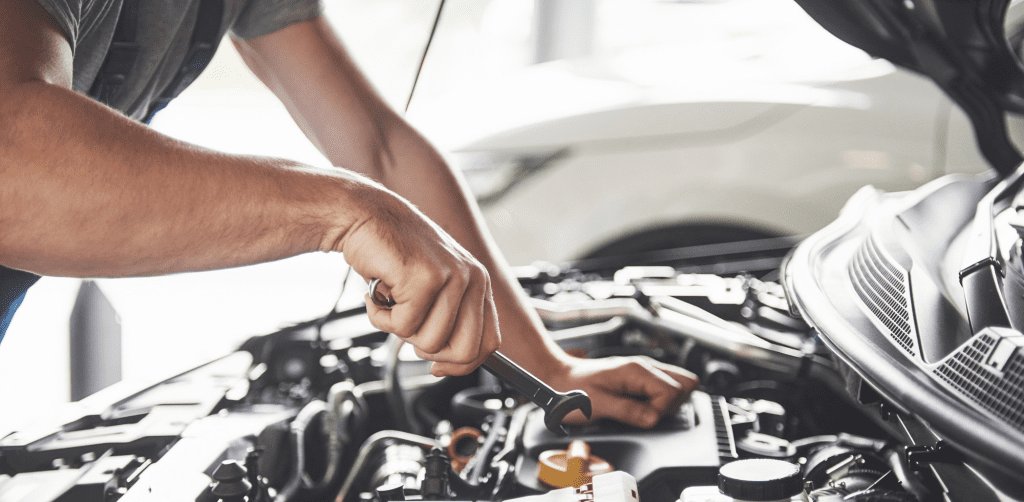Compare cheap car insurance
✔ Compare cheap car insurance quotes
✔ Over 110 insurance providers
✔ Get a quote in minutes
✔ Save up to £504*


Regular car servicing is crucial to maintaining your vehicle’s optimal condition. This comprehensive guide provides all the necessary details about what a car service entails and its associated costs.
- What is a car service?
- Why do I need to service my car?
- How often should you service your car?
- How much is a car service?
- What types of car service are there?
- Frequently asked questions
What is a Car Service?
A car service is a scheduled maintenance check performed by a qualified mechanic to ensure the proper functioning of your vehicle. It involves a comprehensive inspection and servicing of various mechanical, electrical, and safety components to keep your car in optimal condition.
During a car service, the mechanic will carefully examine key areas of your vehicle, including the engine, brakes, suspension, steering, tires, lights, and fluids. They will check for any signs of wear, damage, or potential issues that could affect the performance, safety, or longevity of your car.
The specific tasks carried out during a car service may vary depending on the service package or the manufacturer’s recommended maintenance schedule. Typically, a car service will involve:
Engine oil and filter change: Fresh oil and a new filter help lubricate and protect the engine’s moving parts, ensuring smooth operation and preventing excessive wear.
Inspection of vital components: The mechanic will check the condition of belts, hoses, spark plugs, and other essential engine components to identify any signs of damage or deterioration.
Brakes and suspension inspection: The braking system, including brake pads, discs, and fluid, will be examined to ensure optimal performance and safety. The suspension system will also be checked for wear and proper alignment.
Tyre inspection and rotation: The tyres will be inspected for tread depth, signs of uneven wear, and correct inflation. The mechanic may also recommend rotating the tyres to promote even wear and prolong their lifespan.
Fluid checks and top-ups: The levels and condition of vital fluids such as coolant, brake fluid, power steering fluid, and windshield washer fluid will be assessed and topped up as necessary.
Lights and electrical system: All exterior and interior lights, as well as the electrical system, will be inspected to ensure proper functionality.
The frequency of car servicing depends on various factors, including the age, mileage, and usage of your vehicle. It is generally recommended to follow the manufacturer’s guidelines or have a service performed every 12 months or 12,000 miles, whichever comes first.
Regular car servicing offers several benefits, including improved safety, optimal performance, increased fuel efficiency, and the potential to identify and address issues before they become major and costly problems.
It’s important to choose a reputable and qualified mechanic or service centre for your car service. They should use genuine parts and adhere to industry standards. Keeping a record of your service history and following the recommended maintenance schedule can help maintain the value and reliability of your vehicle.
How much can you save on your car insurance?
Why do I Need to get a Car Service?
Regular car servicing is crucial for maintaining the performance, reliability, and longevity of your vehicle. Here are some key reasons why you should prioritise car servicing:
Enhanced reliability: Routine servicing helps identify and address minor issues before they escalate into major problems that could leave you stranded on the roadside. Regular maintenance ensures that your car’s components and systems are in optimal condition, reducing the risk of unexpected breakdowns.
Cost-effective maintenance: By addressing small issues during servicing, you can prevent them from developing into more significant and costly repairs. Timely maintenance can save you money in the long run by avoiding expensive breakdowns or the need for extensive repairs.


Improved fuel efficiency: A well-maintained car tends to be more fuel-efficient. During servicing, the mechanic will ensure that the engine is clean, filters are replaced, and components are functioning properly. This optimisation can result in better fuel economy, saving you money at the pump.
Extended lifespan: Regular servicing helps to extend the lifespan of your car. By keeping the various systems and components in good working order, you can enjoy your vehicle for a longer period without experiencing premature wear or performance issues.
Resale value retention: A documented service history is highly valued by potential buyers when it comes time to sell your car. A full-service history demonstrates that the vehicle has been well-maintained and cared for, which can increase buyer confidence and potentially help you command a higher resale value.
Safety assurance: Servicing includes thorough inspections of crucial safety components such as brakes, tyres, lights, and suspension. Identifying and rectifying any issues ensures that your vehicle meets the necessary safety standards, providing you and your passengers with a secure driving experience.
To ensure the best results, it’s recommended to follow the manufacturer’s recommended service intervals or consult your car’s manual.
Additionally, choosing a reputable and qualified mechanic or service centre will ensure that the necessary maintenance tasks are performed correctly and that genuine parts are used.
By prioritising regular car servicing, you can enjoy the peace of mind that comes with a reliable and well-maintained vehicle, while potentially saving money in the long run.
How much can you save on your car insurance?
How Often Should I get a Car Service?
| Service type | When to have it |
|---|---|
| Interim service | Every six months or 6,000 miles |
| Full service | Every 12 months or 12,000 miles |
| Major service | Every 24 months or 24,000 miles |
The frequency of car servicing depends on the specific vehicle you drive. To determine when your car is due for a service and the specific tasks involved, it’s essential to refer to the manufacturer’s handbook.
In general, a full service should be carried out once a year to maintain the vehicle’s optimal condition. However, different types of car services may be required at varying intervals.
An interim service is typically recommended every six months or after covering 6,000 miles. This type of service is ideal for vehicles that undergo frequent use and require regular checks to ensure their continued performance.
A full service is typically performed annually or after covering 12,000 miles. This comprehensive service includes a thorough inspection of all major components, fluid changes, and necessary maintenance tasks to keep the car in top shape.
A major service is a more extensive check-up that is typically recommended every 24 months or after covering 24,000 miles. This service involves a detailed examination of the vehicle’s systems and components, including more in-depth maintenance procedures.
It’s important to note that these service intervals are general guidelines, and the specific requirements may vary depending on the make, model, and age of your car.
Consulting with your mechanic or referring to the manufacturer’s recommendations will ensure that you follow the appropriate service schedule for your vehicle.
By adhering to the recommended service intervals, you can help maintain your car’s performance, reliability, and safety, while also potentially identifying and addressing any issues before they become more significant problems.
How much can you save on your car insurance?
How Much is a Car Service?
The cost of a car service can vary depending on several factors, including the type of car you own and where you choose to have the service done.
If you opt to have your car serviced at the same time as your MOT, you may be eligible for a discounted price on the overall service package. However, it’s important to consider that additional costs may arise if any repairs or replacement parts are needed.
As a rough estimate, an interim service can cost around £110, while a full service may start from £170 and a major service from £210. It’s worth noting that these prices are approximate and can vary depending on the specific requirements of your car and the service provider you choose.


To ensure an accurate cost estimate for your car service, it is recommended to contact local service centres or garages and inquire about their pricing. They will be able to provide you with a more precise quote based on your car’s make, model, age, and the specific services included in the package.
Keep in mind that regular car servicing is an essential investment in maintaining your vehicle’s performance, reliability, and longevity. By following the recommended service intervals and addressing any potential issues promptly, you can potentially save on more significant repair costs in the long run.
How much can you save on your car insurance?
What Types of Car Service are there?
There are three main types of car service: an interim service, a full service, and a major service. Each type of service offers different levels of checks and maintenance to ensure your car remains in optimal condition.
An interim service
An interim service is a basic check-up and maintenance service that is typically recommended every six months or after every 6,000 miles, whichever comes first.
During an interim service, your mechanic will focus on essential components and systems to ensure they are functioning properly. This includes tasks such as:
- Replacing the oil and oil filter
- Inspecting seat belts
- Checking lights
- Battery
- Exhaust
- Tyres
- Ensuring the fluid levels are topped up.
A full service
A full service is a more comprehensive service that is usually recommended once a year or after every 12,000 miles. In addition to the checks performed during an interim service, full service includes additional inspections such as:
- Wheel alignment
- Balance, and wheel bearings
- It also involves replacing air and fuel filters to maintain optimal performance.
A major service
A major service is the most extensive service and is typically recommended every 24 months or after every 24,000 miles. It includes all the checks and replacements carried out during an interim and full service and also incorporates additional tasks such as:
- Replacing the brake fluid
- Spark plugs
- Odour and allergy filters
- Conducting a battery test.
It’s important to note that the specific checklist for each service may vary depending on the make and model of your car, as well as the manufacturer’s recommendations. Additionally, the type of engine (petrol, diesel, or electric) may also influence the checks that are performed.
In terms of duration:
- An interim service generally takes around an hour and a half to complete.
- A full service typically requires approximately three hours
- While a major service can take three to four hours.
However, if any issues or problems are identified during the service, the overall duration may be extended to address and resolve those concerns.
Remember, these time estimates are approximate and can vary depending on the complexity of the vehicle and the efficiency of the service provider. It’s advisable to consult with your chosen mechanic or service centre for a more accurate timeframe for your specific car service.
How much can you save on your car insurance?
Frequently asked questions
An MOT (Ministry of Transport) test is a mandatory assessment that ensures your car meets the necessary safety and environmental standards required by law. It is a legal requirement for vehicles that are over three years old (in the UK) and must be conducted annually.
During an MOT, a certified technician will inspect various components of your car, including lights, brakes, steering, suspension, tyres, emissions, and more. The aim is to verify that your vehicle is roadworthy and meets the required standards.
It’s important to note that an MOT does not involve making repairs or carrying out maintenance tasks.
On the other hand, a car service is a comprehensive maintenance check performed by a qualified mechanic or technician. Its purpose is to assess the overall condition of your car and identify any potential issues or areas of concern.
A service goes beyond the requirements of an MOT and typically includes tasks such as changing oil and filters, inspecting and lubricating components, checking fluid levels, testing the battery, examining belts and hoses, and more.
The specific checks and procedures involved in a service may vary depending on the service type (interim, full, or major) and the recommendations of the vehicle manufacturer.
The primary goal of a service is to ensure your car remains in optimal working condition, improve its performance, extend its lifespan, and potentially preserve its resale value.
In summary, while an MOT is a legal requirement to confirm your vehicle’s roadworthiness, a car service is a proactive maintenance measure aimed at keeping your car in prime condition.
Both are important for different reasons, with an MOT focusing on safety and environmental compliance, and a service focusing on maintenance and performance enhancement.
It’s recommended to schedule both an MOT and regular services to ensure your car meets legal requirements and remains well-maintained.
When it comes to getting your car serviced, you have a few options available to you.
Local Garage: Going to a local garage is often the most cost-effective option. However, it’s important to ensure that the garage is experienced in servicing your car’s specific make and model. Additionally, check if they use original or branded parts, as using non-approved parts could potentially invalidate your warranty.
Dealership: Visiting a dealership offers the advantage of mechanics who are specially trained to work with your particular car model. They will have access to brand-new, manufacturer-approved parts. However, dealership services tend to be pricier compared to independent garages.
Chain Service Centres: Chain service centres like Kwik-Fit or Halfords can provide competitive deals on servicing. They may also offer the convenience of performing your MOT (Ministry of Transport) test at the same time. These service centres often have multiple locations, making them easily accessible.
When choosing where to get your car serviced, consider factors such as cost, expertise, convenience, and the warranty implications. It’s a good idea to compare prices and read reviews to ensure you select a reputable service provider. Ultimately, the choice will depend on your priorities and preferences.










